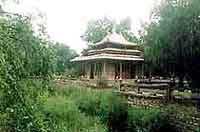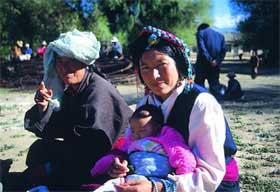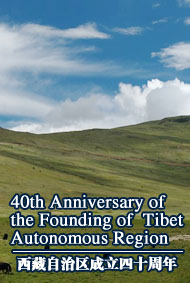| |
Merrymaking in Lingkas
( 2005-10-27 )
 Lhasa, the capital city of Southwest China's Tibet Autonomous Region, is very cold in winter and windy in spring, but in summer it is beautiful and charming: bright sunshine, little wind, and flowing rivers. At that time, the Tibetans, who love the outdoors, camp out in the lingkas (parks) along the Lhasa River. This activity is called "merrymaking in lingkas." Lhasa, the capital city of Southwest China's Tibet Autonomous Region, is very cold in winter and windy in spring, but in summer it is beautiful and charming: bright sunshine, little wind, and flowing rivers. At that time, the Tibetans, who love the outdoors, camp out in the lingkas (parks) along the Lhasa River. This activity is called "merrymaking in lingkas."
According to tradition, merrymaking in lingkas starts from the Saka Dawa Festival (on the 15th day of the 4th Tibetan month), peaks at the Incense Festival (15th day of the 5th month) and the Shoton Festival (first day of the 7th month), and ends at the Bathing Festival early in the 8th month.
When the time for merrymaking in lingkas comes round, the Tibetans dress in their best clothes and rush to the lingkas. Every family sets up a tent in the woods. Most of the tents are white, with simple decorations. People set up cooking facilities, chairs, and tables, on which they place all kinds of food, dishes, and beverages.
The activities in the lingkas are varied and colorful, centered on worshipping the gods and recreation. Many take part in sports competitions. In recent years, the activities have become more and more colorful, and color TVs, video recorders, karaoke machines, and electronic games have all moved into the tents. People sing, dance, tell stories, play games, and drink day and night. Sometimes, they watch films, artistic performances, and Tibetan opera.
 Followers of the Red Sect of Buddhism from eastern Tibet attract people's attention with their sturdy bodies, unique costumes, and huge trumpets. Buddhist nuns sit by the roadside in groups, chanting scriptures to the accompaniment of drums. All the scripture readers meet in the lingka of the Dragon King Lake north of the Potala Palace. They present hadas (ceremonial silk scarves) and butter lamps to the dragon princess. They also paddle boats on the lake, singing the praises of the dragon princess. Followers of the Red Sect of Buddhism from eastern Tibet attract people's attention with their sturdy bodies, unique costumes, and huge trumpets. Buddhist nuns sit by the roadside in groups, chanting scriptures to the accompaniment of drums. All the scripture readers meet in the lingka of the Dragon King Lake north of the Potala Palace. They present hadas (ceremonial silk scarves) and butter lamps to the dragon princess. They also paddle boats on the lake, singing the praises of the dragon princess.
The 5th month by the Tibetan calendar is the best season for visiting the lingka. On the 15th day, the residents of Lhasa dress in their best clothes and pray in the Jokhang Monastery and other monasteries. They also burn incense on high places, and scatter glutinous rice cakes, salt, and highland barley wine as a prayer for peace and happiness.
The 1st day of the 7th month by the Tibetan calendar is the Shoton, or yogurt, Festival. In the 18th century, the Norbu Lingka in the western suburbs of Lhasa became the summer holiday resort of the Dalai Lama. The Shoton Festival was moved there, and was later called the "Norbu Lingka Shoton." From the first day of the seventh month, all people go to the Norbu Lingka to watch Tibetan opera performances.
In early August, the weather starts to get cold. After the Bathing Festival, the leaves began to be yellow, and activities in the lingkas begin to disappear.
|
|

